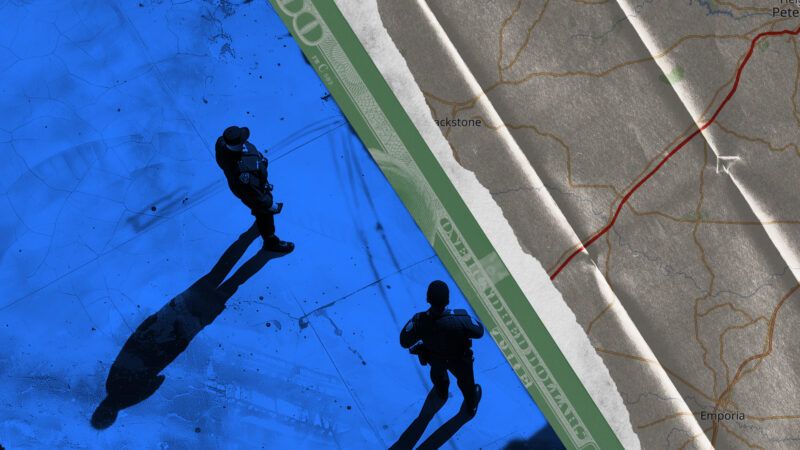South Carolina Cops and Courts Rig the Game Against Drivers
An uneven playing field allows the aggressive tactics and legal loopholes that turn traffic stops into cash grabs.

This is part four of Operation Shakedown, a series about heavy-handed traffic enforcement tactics and property seizures in Spartanburg County, South Carolina. Click here to read part five.
People have rights—even, or perhaps especially, when the police launch investigations against them—but an out-of-state Atlanta driver got little help from the Constitution when a deputy pulled him over on October 5, 2022, in Cherokee County, South Carolina.
The driver had no warrants for his arrest, and the deputy did not witness any criminal conduct. The driver was stopped for allegedly following another vehicle too closely on Interstate 85 in Spartanburg County, South Carolina.
The Fourth Amendment guarantees the right to be "secure in their persons, houses, papers, and effects, against unreasonable searches and seizures." It should have protected the driver from a prolonged interrogation, but courts have gradually excused aggressive police tactics on U.S. roads.
Public records from Operation Rolling Thunder show how this escalation unfolds. The annual blitz, which the Spartanburg County Sheriff's Office and partner agencies have conducted every year since 2006, turns law enforcement into a competitive sport with a game clock and scoreboard. Afterward, the police showcase seized property like a championship trophy at a post-match news conference.
Hometown Referees
During Operation Rolling Thunder, courts assist law enforcement the majority of the time by acting as hometown referees. The losers are the innocent travelers who get searched without cause. Incident reports from the 17th annual blitz from October 2–6, 2022, show that officers seized nothing and made no arrests in 102 of 144 searches. More than 70 percent of vehicles were clean. The failure rate worsens when including searches that produced nothing but cash—which is not illegal to carry.
The Institute for Justice obtained these records through South Carolina's Freedom of Information Act (FOIA) as part of our Project on the Fourth Amendment.
What happened with the out-of-state driver accused of following too closely shows the law enforcement playbook. Upon contact, the deputy ordered the driver to exit his vehicle and sit in the front seat of the patrol cruiser.
Refusing to comply could have landed the man in jail. In 1977, the Supreme Court ruled in Pennsylvania v. Mimms that officers concerned for their safety may order drivers of lawfully stopped vehicles to get out. In 1997, Maryland v. Wilson extended this rule to include passengers as well.
Speculation and Innuendo
Once inside the police cruiser on the shoulder of I-85, the driver found himself isolated without an attorney, answering questions that had nothing to do with traffic enforcement: What were his travel plans? What was his employment? Did he have marijuana in his vehicle?
This bait-and-switch from civil to criminal enforcement undermines the purpose of the traffic code, which is supposed to be about road safety. Yet the Supreme Court held in Whren v. United States in 1996 that pretextual stops are permissible under the Fourth Amendment.
Despite the high-pressure tactics, the Atlanta driver refused to consent to a search. The Supreme Court still allows people to do this—at least for now. But the justices give the police a backup plan: They can call for a K-9 unit and conduct an open-air sniff.
The 2005 decision in Illinois v. Caballes allows the use of drug dogs during pretextual stops, as long as the sniff does not prolong a stop beyond the time needed to complete the ostensible reason for the stop. But the courts never say how long that could mean.
Even if a K-9 unit arrives slowly, the Supreme Court has held that officers can prolong traffic stops if they develop "reasonable suspicion" of some other crime before the initial stop has expired. This was the finding in the 2015 case Rodriguez v. United States.
Reasonable suspicion is a low bar. In the 2020 case Kansas v. Glover, the Supreme Court ruled that speculation is good enough. The police certainly use innuendo during Operation Rolling Thunder.
Unreliable Drug Sniff
The deputy who detained the Atlanta driver turned all of the driver's actions into something sinister. The driver looked "visibly shaken," and this was evidently suspicious. The driver claimed to work occasionally for his father's Georgia-based landscaping business, which had clients in Virginia—this too was considered "odd." The driver avoided eye contact and reacted with surprise when asked about marijuana. According to the report, this suggested drug possession.
The driver watched as a K-9 handler declared a "positive indication" for drugs. In reality, the vehicle contained nothing except THC vape pens, which might have been empty. The report does not indicate the status of the pens or claim the discovery of narcotics.
Regardless, dog alerts are notoriously unreliable. Multiple studies show error rates near 50 percent—making them about as useful as a coin toss. Yet the Supreme Court allows them to establish probable cause; one step above reasonable suspicion.
In the 2013 case Florida v. Harris, the Court held that field results do not matter. If drug dogs are certified by a bona fide organization in a controlled setting, they can fail repeatedly in the real world and still be good enough for government work.
Using the dog alert as probable cause, the police entered the Atlanta man's vehicle and found about $13,000 cash, which he said came from gambling. The police did not arrest him but seized his money and turned it over to Homeland Security for civil forfeiture.
In 102 other cases the same week, officers searched and found nothing. Courts leave these drivers and their passengers vulnerable. Policing becomes a competitive sport during Operation Rolling Thunder, but not on a level playing field.


Show Comments (22)